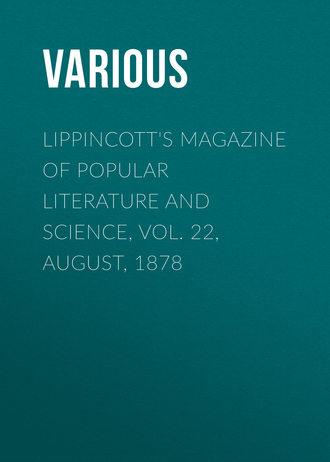 полная версия
полная версияLippincott's Magazine of Popular Literature and Science, Vol. 22, August, 1878
The Romans had extensive establishments at Mehadia, which they called the "Baths of Hercules," and it is in memory of this that a statue of the good giant stands in the square of the little town. Scattered through the hills, many inscriptions to Hercules, to Mercury and to Venus have been found during the ages. The villages on the road thither are few and far between, and are inhabited by peasants decidedly Dacian in type. It is estimated that a million and a half of Roumanians are settled in Hungary, and in this section they are exceedingly numerous. Men and women wear showy costumes, quite barbaric and uncomfortable. The women seem determined to wear as few garments as possible, and to compensate for lack of number by brightness of coloring. In many a pretty face traces of gypsy blood may be seen. This vagabond taint gives an inexpressible charm to a face for which the Hungarian strain has already done much. The coal-black hair and wild, mutinous eyes set off to perfection the pale face and exquisitely thin lips, the delicate nostrils and beautifully moulded chin. Angel or devil? queries the beholder. Sometimes he is constrained to think that the possessor of such a face has the mingled souls of saint and siren. The light undertone of melancholy which pervades gypsy beauty, gypsy music, gypsy manners, has an extremely remarkable fascination for all who perceive it. Even when it is almost buried beneath ignorance and animal craft, it is still to be found in the gypsy nature after diligent search. This strange race seems overshadowed by the sorrow of some haunting memory. Each individual belonging to the Tsiganes whom I saw impressed me as a fugitive from Fate. To look back was impossible; of the present he was careless; the future tempted him on. In their music one now and then hears hints of a desire to return to some far-off and half-forgotten land. But this is rare.
There are a large number of "civilized gypsies," so called, in the neighborhood of Orsova. I never saw one of them without a profound compassion for him, so utterly unhappy did he look in ordinary attire. The musicians who came nightly to play on the lawn in front of the Hungarian Crown inn belonged to these civilized Tsiganes. They had lost all the freedom of gesture, the proud, half-savage stateliness of those who remained nomadic and untrammelled by local law and custom. The old instinct was in their music, but sometimes there drifted into it the same mixture of saint and devil which I had seen in the "composite" faces.
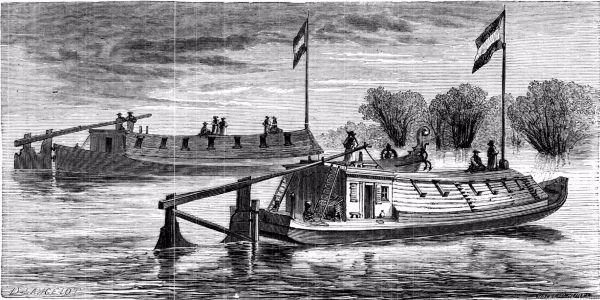
BOATS ON THE DANUBE.
As soon as supper was set forth, piping hot and flanked by flagons of beer and wine, on the lawn, and the guests had assembled to partake of the good cheer, while yet the afterglow lingered along the Danube, these dusky musicians appeared and installed themselves in a corner. The old stream's murmur could not drown the piercing and pathetic notes of the violin, the gentle wail of the guzla or the soft thrumming of the rude tambourine. Little poetry as a spectacled and frosty Austrian officer might have in his soul, that little must have been awakened by the songs and the orchestral performances of the Tsiganes as the sun sank low. The dusk began to creep athwart the lawn, and a cool breeze fanned the foreheads of the listeners. When the light was all gone, these men, as if inspired by the darkness, sometimes improvised most angelic melody. There was never any loud or boisterous note, never any direct appeal to the attention. I invariably forgot the singers and players, and the music seemed a part of the harmony of Nature. While the pleasant notes echoed in the twilight, troops of jaunty young Hungarian soldiers, dressed in red hose, dark-green doublets and small caps sometimes adorned with feathers, sauntered up and down the principal street; the refugees huddled in corners and listened with delight; the Austrian officials lumbered by, pouring clouds of smoke from their long, strong and inevitable cigars; and the dogs forgot their perennial quarrel for a few instants at a time.
The dogs of Orsova and of all the neighboring country have many of the characteristics of their fellow-creatures in Turkey. Orsova is divided into "beats," which are thoroughly and carefully patrolled night and day by bands of dogs who recognize the limits of their domain and severely resent intrusion. In front of the Hungarian Crown a large dog, aided by a small yellow cur and a black spaniel mainly made up of ears and tail, maintained order. The afternoon quiet was generally disturbed about four o'clock by the advent of a strange canine, who, with that expression of extreme innocence which always characterizes the animal that knows he is doing wrong, would venture on to the forbidden ground. A low growl in chorus from the three guardians was the inevitable preliminary warning. The new-comer usually seemed much surprised at this, and gave an astonished glance: then, wagging his tail merrily, as much as to say, "Nonsense! I must have been mistaken," he approached anew. One of the trio of guardians thereupon sallied forth to meet him, followed by the others a little distance behind. If the strange dog showed his teeth, assumed a defiant attitude and seemed inclined to make his way through any number of enemies, the trio held a consultation, which, I am bound to say, almost invariably resulted in a fight. The intruder would either fly yelping, or would work his way across the interdicted territory by means of a series of encounters, accompanied by the most terrific barking, snapping and shrieking, and by a very considerable effusion of blood. The person who should interfere to prevent a dog-fight in Orsova would be regarded as a lunatic. Sometimes a large white dog, accompanied by two shaggy animals resembling wolves so closely that it was almost impossible to believe them guardians of flocks of sheep, passed by the Hungarian Crown unchallenged, but these were probably tried warriors whose valor was so well known that they were no longer questioned anywhere.
The gypsies have in their wagons or following in their train small black dogs of temper unparalleled for ugliness. It is impossible to approach a Tsigane tent or wagon without encountering a swarm of these diminutive creatures, whose rage is not only amusing, but sometimes rather appalling to contemplate. Driving rapidly by a camp one morning in a farmer's cart drawn by two stout horses adorned with jingling bells, I was followed by a pack of these dark-skinned animals. The bells awoke such rage within them that they seemed insane under its influence. As they leaped and snapped around me, I felt like some traveller in a Russian forest pursued by hungry wolves. A dog scarcely six inches high, and but twice as long, would spring from the ground as if a pound of dynamite had exploded beneath him, and would make a desperate effort to throw himself into the wagon. Another, howling in impotent anger, would jump full at a horse's throat, would roll beneath the feet of the team, but in some miraculous fashion would escape unhurt, and would scramble upon a bank to try again. It was a real relief when the discouraged pack fell away. Had I shot one of the animals, the gypsies would have found a way to avenge the death of their enterprising though somewhat too zealous camp-follower. Animals everywhere on these border-lines of the Orient are treated with much more tenderness than men and women are. The grandee who would scowl furiously in this wild region of the Banat if the peasants did not stand by the roadside and doff their hats in token of respect and submission as he whirled by in his carriage, would not kick a dog out of his way, and would manifest the utmost tenderness for his horses.
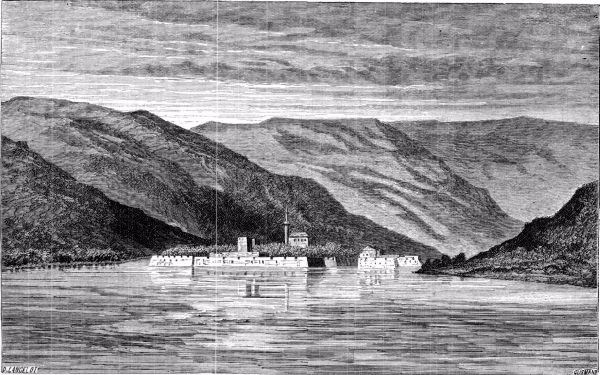
ORSOVA.
Much as the Hungarian inhabitants of the Banat hate the Roumanians, they do not fail to appreciate the commercial advantages which will follow on the union of the two countries by rail. Pretty Orsova may in due time become a bustling town filled with grain- and coal-dépôts and with small manufactories. The railway from Verciorova on the frontier runs through the large towns Pitesti and Craiova on its way to Bucharest. It is a marvellous railroad: it climbs hills, descends into deep gullies, and has as little of the air-line about it as a great river has, for the contractors built it on the principle of "keeping near the surface," and they much preferred climbing ten high mountains to cutting one tunnel. Craiova takes its name, according to a somewhat misty legend, from John Assan, who was one of the Romano-Bulgarian kings, Craiova being a corruption of Crai Ivan ("King John"). This John was the same who drank his wine from a cup made out of the skull of the unlucky emperor Baldwin I. The old bans of Craiova gave their title to the Roumanian silver pieces now known as bañi. Slatina, farther down the line, on the river Altu (the Aluta of the ancients), is a pretty town, where a proud and brave community love to recite to the stranger the valorous deeds of their ancestors. It is the centre from which have spread out most of the modern revolutionary movements in Roumania. "Little Wallachia," in which Slatina stands, is rich in well-tilled fields and uplands covered with fat cattle: it is as fertile as Kansas, and its people seemed to me more agreeable and energetic than those in and around Bucharest.
He who clings to the steamers plying up and down the Danube sees much romantic scenery and many curious types, but he loses all the real charm of travel in these regions. The future tourist on his way to or from Bulgaria and the battle-fields of the "new crusade" will be wise if he journeys leisurely by farm-wagon—he will not be likely to find a carriage—along the Hungarian bank of the stream. I made the journey in April, when in that gentle southward climate the wayside was already radiant with flowers and the mellow sunshine was unbroken by cloud or rain. There were discomfort and dust, but there was a rare pleasure in the arrival at a quaint inn whose exterior front, boldly asserting itself in the bolder row of house-fronts in a long village street, was uninviting enough, but the interior of which was charming. In such a hostelry I always found the wharfmaster, in green coat and cap, asleep in an arm-chair, with the burgomaster and one or two idle landed proprietors sitting near him at a card-table, enveloped in such a cloud of smoke that one could scarcely see the long-necked flasks of white wine which they were rapidly emptying. The host was a massive man with bulbous nose and sleepy eyes: he responded to all questions with a stare and the statement that he did not know, and seemed anxious to leave everything in doubt until the latest moment possible. His daughter, who was brighter and less dubious in her responses than her father, was a slight girl with lustrous black eyes, wistful lips, a perfect form, and black hair covered with a linen cloth that the dust might not come near its glossy threads. When she made her appearance, flashing out of a huge dark room which was stone paved and arched overhead, and in which peasants sat drinking sour beer, she seemed like a ray of sunshine in the middle of night. But there was more dignity about her than is to be found in most sunbeams: she was modest and civil in answer, but understood no compliments. There was something of the princess-reduced-in-circumstances in her demeanor. A royal supper could she serve, and the linen which she spread on the small wooden table in the back courtyard smelled of lavender. I took my dinners, after the long days' rides, in inns which commanded delicious views of the Danube—points where willows overhung the rushing stream, or where crags towered above it, or where it flowed in smooth yet resistless might through plains in which hundreds of peasants were toiling, their red-and-white costumes contrasting sharply with the brilliant blue of the sky and the tender green of the foliage.

BELGRADE, FROM SEMLIN.
If the inns were uniformly cleanly and agreeable, as much could not be said for the villages, which were sometimes decidedly dirty. The cottages of the peasants—that is, of the agricultural laborers—were windowless to a degree which led me to look for a small- and dull-eyed race, but the eloquent orbs of youths and maidens in all this Banat land are rarely equalled in beauty. I found it in my heart to object to the omnipresent swine. These cheerful animals were sometimes so domesticated that they followed their masters and mistresses afield in the morning. In this section of Hungary, as indeed in most parts of Europe, the farm-houses are all huddled together in compact villages, and the lands tilled by the dwellers in these communities extend for miles around them. At dawn the procession of laborers goes forth, and at sunset it returns. Nothing can give a better idea of rural simplicity and peace than the return of the peasants of a hamlet at eventide from their vineyards and meadows. Just as the sun was deluging the broad Danube with glory before relinquishing the current to the twilight's shades I came, in the soft April evening, into the neighborhood of Drenkova. A tranquil afterglow was here and there visible near the hills, which warded off the sun's passionate farewell glances at the vines and flowers. Beside the way, on the green banks, sat groups of children, clad with paradisiacal simplicity, awaiting their fathers and mothers. At a vineyard's hedge a sweet girl, tall, stately and melancholy, was twining a garland in the cap of a stout young fellow who rested one broad hand lightly upon her shoulder. Old women, bent and wrinkled, hobbled out from the fields, getting help from their sons or grandsons. Sometimes I met a shaggy white horse drawing a cart in which a dozen sonsie lasses, their faces browned by wind and their tresses blown back from their brows in most bewitching manner by the libertine breeze, were jolting homeward, singing as they went. The young men in their loose linen garments, with their primitive hoes and spades on their shoulders, were as goodly specimens of manly strength and beauty as one could wish to look upon. It hurt me to see them stand humbly ranged in rows as I passed. But it was pleasant to note the fervor with which they knelt around the cross rearing its sainted form amid the waving grasses. They knew nothing of the outer world, save that from time to time the emperor claimed certain of their number for his service, and that perhaps their lot might lead them to the great city of Buda-Pesth. Everywhere as far as the eye could reach the land was cultivated with greatest care, and plenty seemed the lot of all. The peasant lived in an ugly and windowless house because his father and grandfather had done so before him, not because it was necessary. It was odd to see girls tall as Dian, and as fair, bending their pretty bodies to come out of the contemptible little apertures in the peasant-houses called "doors."
Drenkova is a long street of low cottages, with here and there a two-story mansion to denote that the proprietors of the land reside there. As I approached the entrance to this street I saw a most remarkable train coming to meet me. One glance told me that it was a large company of gypsies who had come up from Roumania, and were going northward in search of work or plunder. My driver drew rein, and we allowed the swart Bohemians to pass on—a courtesy which was gracefully acknowledged with a singularly sweet smile from the driver of the first cart. There were about two hundred men and women in this wagon-train, and I verily believe that there were twice as many children. Each cart, drawn by a small Roumanian pony, contained two or three families huddled together, and seemingly lost in contemplation of the beautiful sunset, for your real gypsy is a keen admirer of Nature and her charms. Some of the women were intensely hideous: age had made them as unattractive as in youth they had been pretty; others were graceful and well-formed. Many wore but a single garment. The men were wilder than any that I had ever before seen: their matted hair, their thick lips and their dark eyes gave them almost the appearance of negroes. One or two of them had been foraging, and bore sheeps' heads and hares which they had purchased or "taken" in the village. They halted as soon as they had passed me, and prepared to go into camp; so I waited a little to observe them. During the process of arranging the carts for the night one of the women became enraged at the father of her brood because he would not aid her in the preparation of the simple tent under which the family was to repose. The woman ran to him, clenching her fist and screaming forth invective which, I am convinced, had I understood it and had it been directed at me, I should have found extremely disagreeable. After thus lashing the culprit with language for some time, she broke forth into screams and danced frantically around him. He arose, visibly disturbed, and I fancied that his savage nature would come uppermost, and that he might be impelled to give her a brutal beating. But he, on the contrary, advanced leisurely toward her and spat upon the ground with an expression of extreme contempt. She seemed to feel this much more than she would have felt a blow, and her fury redoubled. She likewise spat; he again repeated the contemptuous act; and after both had gratified the anger which was consuming them, they walked off in different directions. The battle was over, and I was not sorry to notice a few minutes later that paterfamilias had thought better of his conduct, and was himself spreading the tent and setting forth his wandering Lares and Penates.
A few hundred yards from the point where these wanderers had settled for the night I found some rude huts in which other gypsies were residing permanently. These huts were mere shelters placed against steep banks or hedges, and within there was no furniture save one or two blankets, a camp-kettle and some wicker baskets. Young girls twelve or thirteen years of age crouched naked about a smouldering fire. They did not seem unhappy or hungry; and none of these strange people paid any attention to me as I drove on to the inn, which, oddly enough, was at some distance from the main village, hard by the Danube side, in a gully between the mountains, where coal-barges lay moored. The Servian Mountains, covered from base to summit with dense forests, cast a deep gloom over the vale. In a garden on a terrace behind the inn, by the light of a flickering candle, I ate a frugal dinner, and went to bed much impressed by the darkness, in such striking contrast to the delightful and picturesque scenes through which I had wandered all day.
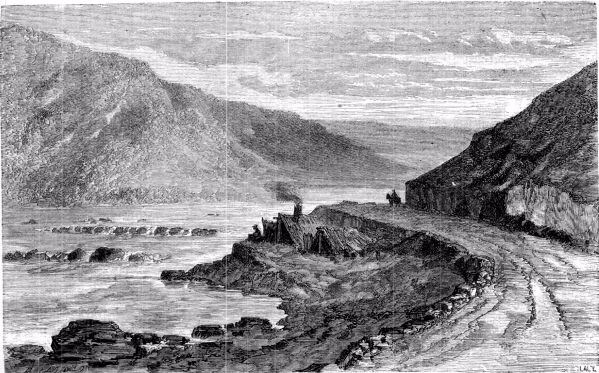
THE IRON GATES.
But I speedily forgot this next morning, when the landlord informed me that, instead of toiling over the road along the crags to Orsova, whither I was returning, I could embark on a tug-boat bound for that cheerful spot, and could thus inspect the grand scenery of the Iron Gates from the river. The swift express-boats which in time of peace run from Vienna to Rustchuk whisk the traveller so rapidly through these famous defiles that he sees little else than a panorama of high rocky walls. But the slow-moving and clumsy tug, with its train of barges attached, offers better facilities to the lover of natural beauty. We had dropped down only a short distance below Drenkova before we found the river-path filled with eddies, miniature whirlpools, denoting the vicinity of the gorges into which the great current is compressed. These whirlpools all have names: one is called the "Buffalo;" a second, Kerdaps; a third is known as the "Devourer." The Turks have a healthy awe of this passage, which in old times was a terrible trial to these stupid and always inefficient navigators. For three or four hours we ran in the shade of mighty walls of porphyry and granite, on whose tops were forests of oaks and elms. High up on cliffs around which the eagles circle, and low in glens where one sometimes sees a bear swimming, the sun threw a flood of mellow glory. I could fancy that the veins of red porphyry running along the face of the granite were blood-stains, the tragic memorials of ancient battles. For, wild and inaccessible as this region seems, it has been fought over and through in sternest fashion. Perched on a little promontory on the Servian side is the tiny town of Poretch, where the brave shepherds and swineherds fought the Turk, against whose oppression they had risen, until they were overwhelmed by numbers, and their leader, Hadji Nikolos, lost his head. The Austrians point out with pride the cave on the tremendous flank of Mount Choukourou where, two centuries ago, an Austrian general at the head of seven hundred men, all that was left to him of a goodly army, sustained a three months' siege against large Turkish forces. This cave is perched high above the road at a point where it absolutely commands it, and the government of to-day, realizing its importance, has had it fortified and furnished with walls pierced by loopholes. Trajan fought his way through these defiles in the very infancy of the Christian era; and in memory of his first splendid campaign against the Dacians he carved in the solid rock the letters, some of which are still visible, and which, by their very grandiloquence, offer a mournful commentary on the fleeting nature of human greatness. Little did he think when his eyes rested lovingly on this inscription, beginning—
IMP. CÆS. D. NERVÆ FILIUS NERVATRAJANUS. GERM. PONT. MAXIMUS—that Time with profane hand would wipe out the memory of many of his glories and would undo all the work that he had done.
On we drifted, through huge landlocked lakes, out of which there seemed no issue until we chanced upon a miraculous corner where there was an outlet frowned upon by angry rocks; on to the "Caldron," as the Turks called the most imposing portion of the gorge; on through an amphitheatre where densely-wooded mountains on either side were reflected in smooth water; on beneath masses that appeared about to topple, and over shallows where it looked as if we must be grounded; on round a bluff which had hidden the sudden opening of the valley into a broad sweep, and which had hindered us from seeing Orsova the Fair nestling closely to her beloved mountains.
Edward King.THE PARIS EXPOSITION OF 1878
I.—BUILDINGS AND GROUNDS
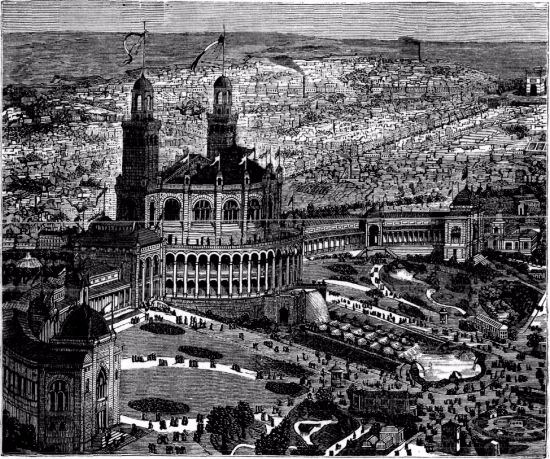
THE TROCADÉRO AND GROUNDS.
It is customary to speak of things by comparison, and the question is constantly propounded here, as it will be to returned Americans: "How does the Exposition compare with the Centennial of 1876?" This is not to be answered by vague generalities nor by sweeping statements.
It must of course be true that a great nation could not fail to make interesting an object upon which it has lavished money and which has obtained the co-operation of the principal foreign nations. So much is true equally of Philadelphia and Paris, and the merits of each are such that comparisons may be instituted which shall be derogatory to neither.
The scale of each is immense, and the buildings of both well filled and overflowing into numerous annexes. Fairmount had the advantage of breadth of ground for all comers. The Champ de Mars is but little over one hundred acres in area, while the portion of Fairmount Park conceded to the Exposition was two hundred and sixty acres.
The Champ de Mars is simply crowded with buildings, and is hemmed in by houses except at the end where it abuts upon the Seine. The space between the river and the main building is the only breathing-ground on that side of the river, the only place large enough for a band to play in the open air with allowance for a moderate crowd of listeners; and even this portion has a far larger number of detached houses than elegance or convenience of view would dictate. It was otherwise in Philadelphia, where the ample room gave a sensation of freedom, and the wide lawns, and even rustic hollows, permitted rambles, picnic lunches and parties. Herein consists one of the most striking features of dissimilarity between the Philadelphia and Paris expositions. The former had plenty of room—the latter has insufficient. The former, with the exception of the Main and Machinery Buildings, with a few adjuncts, and the Art-Gallery, a little retired from the Main Building, had its structures dotted over a wide expanse bordering its lakes or along an encircling drive. For want of any other sufficient opportunity to display the architecture of the countries assembled, one of the interior façades of the Paris building has a series of characteristic house-fronts looking upon an allée of but fifty feet in width, which is dignified by the title of "The Street of Nations."









